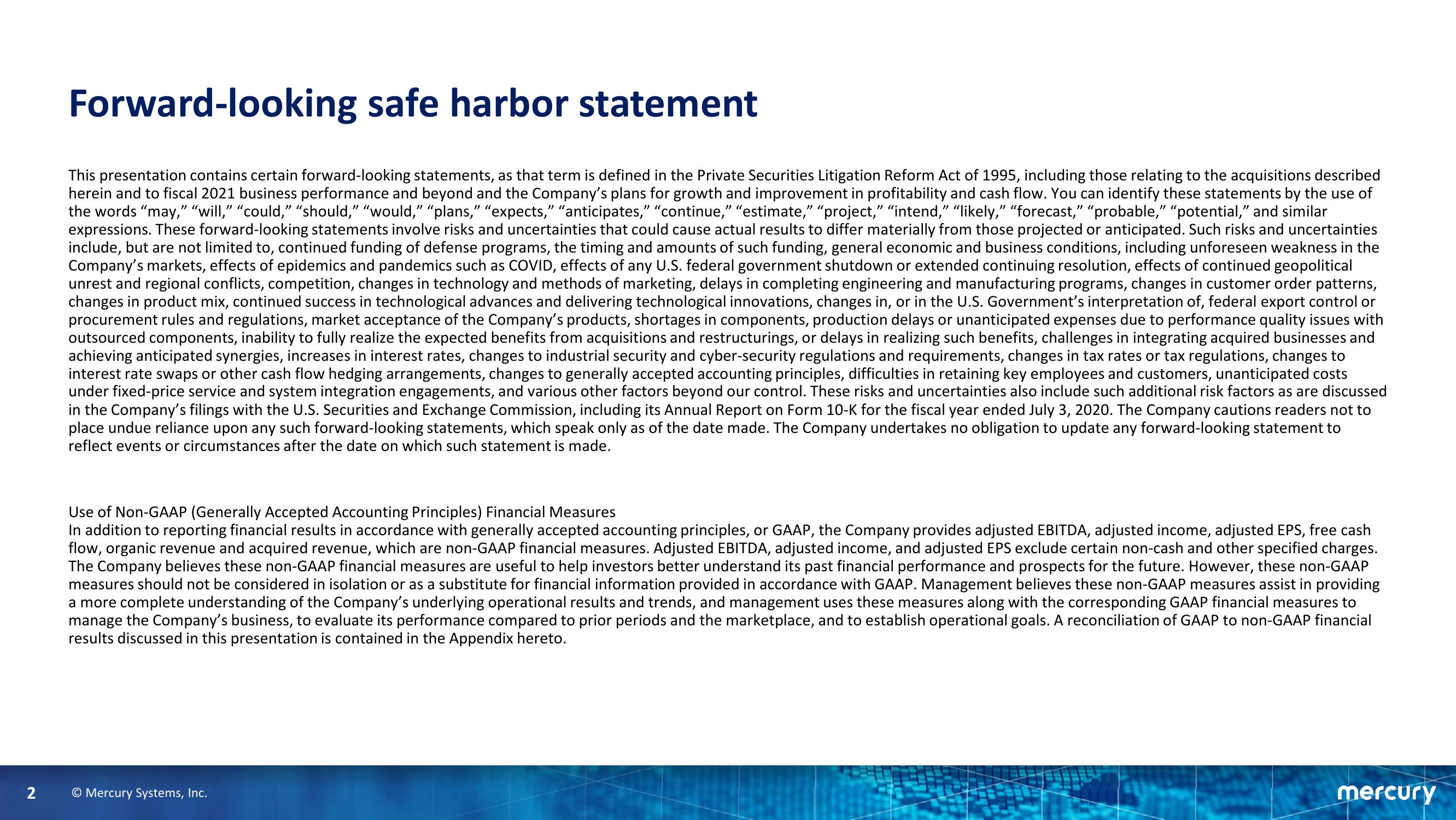Forward-Looking Acquisitions Deck
2
Forward-looking safe harbor statement
This presentation contains certain forward-looking statements, as that term is defined in the Private Securities Litigation Reform Act of 1995, including those relating to the acquisitions described
herein and to fiscal 2021 business performance and beyond and the Company's plans for growth and improvement in profitability and cash flow. You can identify these statements by the use of
the words "may," "will," "could," "should," "would," "plans," "expects," "anticipates," "continue," "estimate," "project," "intend," "likely," "forecast," "probable," "potential," and similar
expressions. These forward-looking statements involve risks and uncertainties that could cause actual results to differ materially from those projected or anticipated. Such risks and uncertainties
include, but are not limited to, continued funding of defense programs, the timing and amounts of such funding, general economic and business conditions, including unforeseen weakness in the
Company's markets, effects of epidemics and pandemics such as COVID, effects of any U.S. federal government shutdown or extended continuing resolution, effects of continued geopolitical
unrest and regional conflicts, competition, changes in technology and methods of marketing, delays in completing engineering and manufacturing programs, changes in customer order patterns,
changes in product mix, continued success in technological advances and delivering technological innovations, changes in, or in the U.S. Government's interpretation of, federal export control or
procurement rules and regulations, market acceptance of the Company's products, shortages in components, production delays or unanticipated expenses due to performance quality issues with
outsourced components, inability to fully realize the expected benefits from acquisitions and restructurings, or delays in realizing such benefits, challenges in integrating acquired businesses and
achieving anticipated synergies, increases in interest rates, changes to industrial security and cyber-security regulations and requirements, changes in tax rates or tax regulations, changes to
interest rate swaps or other cash flow hedging arrangements, changes to generally accepted accounting principles, difficulties in retaining key employees and customers, unanticipated costs
under fixed-price service and system integration engagements, and various other factors beyond our control. These risks and uncertainties also include such additional risk factors as are discussed
in the Company's filings with the U.S. Securities and Exchange Commission, including its Annual Report on Form 10-K for the fiscal year ended July 3, 2020. The Company cautions readers not to
place undue reliance upon any such forward-looking statements, which speak only as of the date made. The Company undertakes no obligation to update any forward-looking statement to
reflect events or circumstances after the date on which such statement is made.
Use of Non-GAAP (Generally Accepted Accounting Principles) Financial Measures
In addition to reporting financial results in accordance with generally accepted accounting principles, or GAAP, the Company provides adjusted EBITDA, adjusted income, adjusted EPS, free cash
flow, organic revenue and acquired revenue, which are non-GAAP financial measures. Adjusted EBITDA, adjusted income, and adjusted EPS exclude certain non-cash and other specified charges.
The Company believes these non-GAAP financial measures are useful to help investors better understand its past financial performance and prospects for the future. However, these non-GAAP
measures should not be considered in isolation or as a substitute for financial information provided in accordance with GAAP. Management believes these non-GAAP measures assist in providing
a more complete understanding of the Company's underlying operational results and trends, and management uses these measures along with the corresponding GAAP financial measures to
manage the Company's business, to evaluate its performance compared to prior periods and the marketplace, and to establish operational goals. A reconciliation of GAAP to non-GAAP financial
results discussed in this presentation is contained in the Appendix hereto.
Ⓒ Mercury Systems, Inc.
mercuryView entire presentation